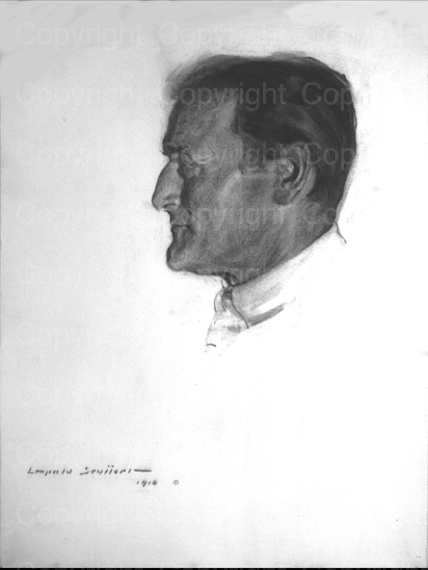Muck’s Arrest
Muck was taken by armed guards in April 1918 on the Federal Express train from Boston to Fort Oglethorpe Georgia, where he remained in prison for a year and a half. In August 1919, before his deportation, Muck rebelled his unjust incarceration by conducting his orchestra entirely in the nude in front of the camp’s machine gun towers and barbed wire fencing. In reporting this incident later to renowned journalist H.L. Mencken, Muck got the last word about his mistreatment in the American press.
Photo courtesy of National Archives Records Administration
Rosamond Young
Rosamond Young was a rising New England Conservatory opera singer involved in a romantic liaison with Muck. Federal officials raided her home and acquired a private cache of incriminating love letters used to bring down the famous German conductor. The Karl Muck Scandal recreates Boston’s steamier sexual climate as soldiers and sailors visited this active port town. Burrage shows how Muck was baited for his sexual indiscretions and why he chose arrest as a “dangerous enemy alien” instead of facing prosecution for sexual crimes in America’s most puritanical city.
Photo courtesy of Melissa D. Burrage Collection
THE KARL MUCK SCANDAL PROVIDES BOTH A WINDOW TO VIEW AMERICA OF A CENTURY AGO AND A REFLECTIVE MIRROR TO SEE THE XENOPHOBIC TIME THAT WE ARE LIVING IN TODAY.
THE KARL MUCK SCANDAL
Karl Muck
The Karl Muck Scandal, most broadly, tracks the mistreatment of immigrant populations during World War I, looking specifically at Boston as well as the United States to show how ethnic presence and cosmopolitanism thrived before the war and how hatred and federal policies destroyed that vitality at the height of the conflict. Through the lens of Dr. Karl Muck, the world renowned German conductor of the Boston Symphony Orchestra, Burrage vividly showcases Boston in the pre-war years when German presence and cultural cosmopolitanism thrived, and what happened to that dynamism and vitality at the height of the conflict. She focuses on competitive factors—the rivalry between Boston and New York—to show how and why Karl Muck was targeted, arrested, interned, and then deported. In the United States, his civil liberties were clearly violated.
Photo courtesy of Robert Seyffert, robertseyffert.com.
Mrs. William Jay
At the outset of America’s involvement in World War I, wealthy New York Philharmonic board member Mrs. William Jay, attempted to sabotage the Boston Symphony and elevate the position of its rival and up-and-coming New York orchestra. New York was on the rise as a global center of commerce, and Jay, whose family were agents of the North Lloyd German Steamship line, had personal motives to attack the famous conductor. Using anti-German hysteria in her media campaign against Muck, she and other New York elites, convinced the federal government to arrest him, not only for initial accusations that he was a spy and a German agent, but ultimately for sex crimes, a story that tore apart the tight knit Boston music community and laid bare the hypocrisy of the city’s conservative elite morality.
Photo courtesy of Library of Congress
Muck and Hitler
The Karl Muck Scandal follows Muck back to Germany after the war, tracing his anti-Semitism and personal connection to Adolf Hitler. Burrage unpacks his complex personality, including his German nationalism, his sense of cultural superiority, and his expressions of antisemitism in Boston and Europe, bookending Muck’s (and Boston Brahmins’) biases in the United States with his dangerous actions in Germany after World War I, when he became closely allied with the Richard Wagner family and Adolf Hitler at Bayreuth, and when Muck fired Jewish members of his orchestra--men who were ultimately killed at Auschwitz. The Karl Muck Scandal shows this spectrum of religious and ethnic intolerance in both the U.S. and Germany.
Photo courtesy of Library of Congress
Richard Wagner’s Lohengrin (Act 3)
The Boston Symphony Orchestra conducted by Dr. Karl Muck
Edison Studio, Camden, New Jersey 1917
Listen to this episode of Power Play, where Ross and Karbo discuss the Karl Muck Scandal in detail:







